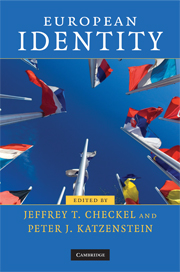Book contents
- Frontmatter
- Contents
- List of figures
- List of tables
- List of contributors
- Preface
- 1 The politicization of European identities
- Part I European identity as project
- Part II European identity as process
- Part III European identity in context
- 8 Identification with Europe and politicization of the EU since the 1980s
- 9 Conclusion – European identity in context
- Bibliography
- Index
8 - Identification with Europe and politicization of the EU since the 1980s
Published online by Cambridge University Press: 05 June 2012
- Frontmatter
- Contents
- List of figures
- List of tables
- List of contributors
- Preface
- 1 The politicization of European identities
- Part I European identity as project
- Part II European identity as process
- Part III European identity in context
- 8 Identification with Europe and politicization of the EU since the 1980s
- 9 Conclusion – European identity in context
- Bibliography
- Index
Summary
Since the 1980s, the European Union (EU) has undergone a process of profound politicization and a deliberate, though less striking process of de-politicization. These developments have left their mark on the identification of Europeans with Europe and the EU. This identification has some specific qualities: it is predominantly liberal; it attempts to encompass Europe's substantial internal diversities; it is based on common social and cultural rather than political experiences; and it is disappointingly weak in the view of some, surprisingly substantial in the view of others. These qualities, I argue, have much to do with the distinctive politicization the EU has experienced since the early 1980s. I start with a short outline of the history of the politicization and de-politicization of European affairs since the 1980s. In the second section I analyze changes in the identification with Europe under five separate headings. The final section develops my answer to the question of how politicization and identification with Europe have become deeply intertwined.
Politicization and de-politicization since the 1980s
Since the 1980s, the EU has experienced a period of politicization, as profound decisions affecting the character and future course of the EU became matters of public debate. Previously, there had existed a diffuse and largely uncontroversial general support for complicated expert decisions, for example on the creation of a common market, a common agricultural policy, and various European funds. After the mid-1980s, debates on Europe became more contentious, with increasingly clear contrasts between supporters and opponents of the European project.
- Type
- Chapter
- Information
- European Identity , pp. 193 - 212Publisher: Cambridge University PressPrint publication year: 2009
- 13
- Cited by

